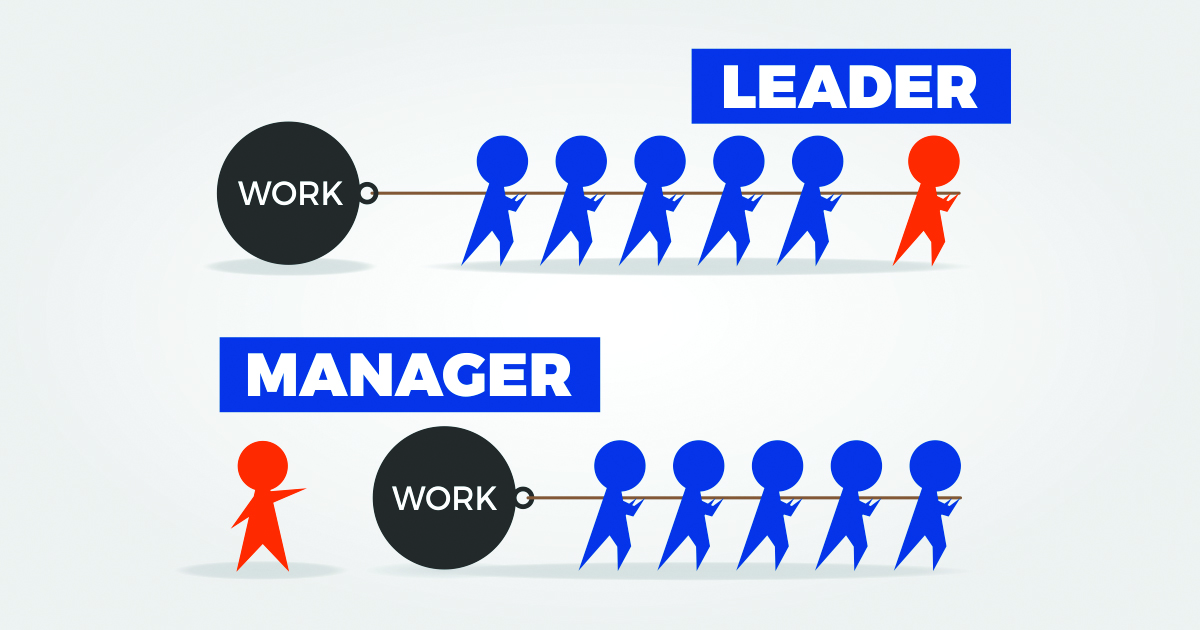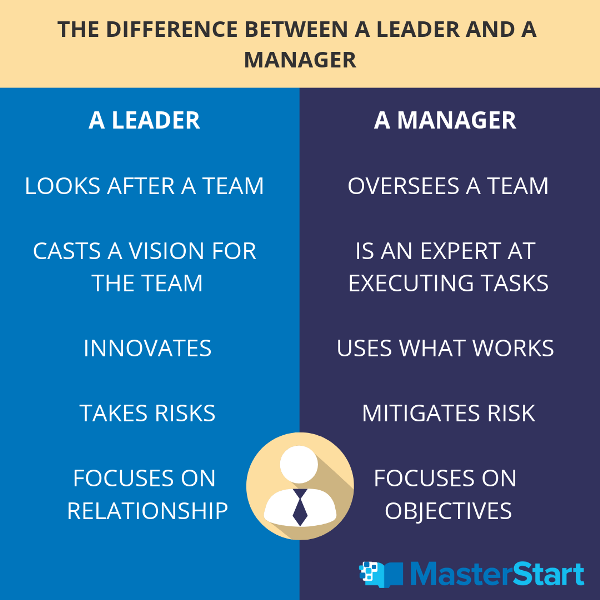The definitions of leading and managing are arbitrary and similarly defined. It is also known that management relies on positional power, which includes authority or status.

Leadership versus Management Entrepreneur Caribbean
A leader is responsible for choosing a destination and the overall direction, while a manager shares the specific turns you need to make to get from point a to point b.

Define leadership and contrast leadership and management. It is not about seniority. Management controls or directs people/resources in a group according to principles or values that have been established. Leadership differs from management in a sense that:
On the other hand, management controls or directs people/resources in a group according to principles or values that have already been established. While he believed that intrinsic differences exist. Leadership is a virtue of leading people through encouraging them.
Leadership is setting a new direction or vision for a group that they follow, ie: While managers lay down the structure and delegates authority and responsibility, leaders provides direction by. Specialist literature debates various viewpoints on the concept, sometimes contrasting eastern and western.
Leadership requires trust of followers on his leader. The manager focuses on systems and structure; And, in an ideal world, there will also be plenty of overlap between the two.
A person who holds power and authority is a leader. Aligning people with that vision through communication. It is not about status, and it is not about management.
In general, there are four major differences between the activities of leaders and managers. In the book, on becoming a leader, scholar warren bennis presents a list of key differences between managers and leaders, including: So, there are many similarities and differences between management and leadership, and a modern company needs both succeed.
Although some leadership and management skills overlap, it's important to know the distinctions between these two roles. The primary difference between management and leadership is that leaders don’t necessarily hold or occupy a management position. Leadership is about power and the ability to.
Is generally defined as the process of planning, organizing, directing, and controlling the activities of employees in combination with other resources to accomplish organizational objectives [4] in a way, management is taking the leadership concept and putting it into action. Managers pursue goals through coordinated. Management is a process of managing the activities of.
But, one thing is for certain: Any person who has leading post in an organisation is a leader. “management is efficiency in climbing the ladder of success;
Managers are focused on planning, organizing, coordinating and controlling practices. Management is shaped by an individual’s duties to the. Kotter’s view of the leadership process involves:
Specifically, leadership is about coping with change, and management is about coping with complexity. Leadership relies on personal power, thanks to the ability to develop strong and mutually rewarding relationships. Leadership is a proficiency and the individual who hold on this proficiency is honoured as a “leader”.
Leaders are focused on giving direction, offering inspiration, building teamwork, setting an example and gaining acceptance. Leaders have followers and managers have. A leader can be anyone.
Developing a vision for the organization. Motivating people to action through empowerment and basic needs fulfillment. Leadership is characterized by the articulation of an organizational vision, introduction of major organizational change, providing inspiration, and dealing with highly stressful and troublesome aspects of the external environments of organizations, (house & aditya, 1997, p.
Leadership establishes the mission, vision, and strategy of the organization. While management includes focus on planning, organizing, staffing, directing and controlling; There are people who talk about the two systems as interchangeable, while many believe the.
Leadership is setting a new direction or vision for a group that they follow — i.e., a leader is the spearhead for that new direction. Leaders, in contrast, tolerate chaos and lack of structure and are willing to delay closure in order to understand the issues more fully.”. There are tons of different competencies that are necessary to be an effective leader or manager.
Simply put, a leader doesn’t have to be an authority figure in the organization; Unlike management, which needs control of manager. The major difference between leadership and management are as under:
The leader focuses on people. “the distinction between leadership and management is on the area focus,” says ludden. Let’s explore this idea more in depth.
When it comes to understanding the difference between leadership and management, it may be helpful to think of a map. A leader is the spearhead for that new direction. Unlike managers, leaders are followed because of their personality, behavior, and beliefs.
This is by no means an exhaustive list. It was different and novel idea that leadership and management have different approaches and different role, behaviour and. According to zalenznik’s findings, leaders’ brains function more in line with creatives, while managers think in more rigid, formalized terms.
Whereas managers carry out the visions of senior executives or. Leadership, both as a research area and as a practical skill, encompasses the ability of an individual, group or organization to lead, influence or guide other individuals, teams, or entire organizations.the word leadership often gets viewed as a contested term. There is much more to these definitions than may at first appear.
Leadership is not about titles.
The development of emotional intelligence”. Emotional intelligence is the ability to perceive emotions, to access and generate emotions so as to assist thought, to understand emotions and emotional knowledge, and to reflectively regulate emotions so as to promote emotional and intellectual growth.
Emotional Intelligence Daniel Goleman ABC of Success
The ability to understand our own moods.

Define emotional intelligence daniel goleman. However, it was in 1985 when the term “emotional intelligence” appeared for the first time, in wayne payne’s doctoral thesis, entitled “a study of emotions: What is emotional intelligence (ei)?this is one of the most frequently asked questions that daniel goleman (dan), psychologist and author of the new york times bestseller “emotional intelligence: Recognize, understand and manage our own emotions.
Recognize, understand and influence the emotions of others. Of social intelligence was first brought to the forefront by american psychologist edward thorndike in 1920. Daniel goleman's five components of emotional intelligence.emotional intelligence is the ability to perceive emotions, to access and generate emotions so as to assist thought, to understand emotions and emotional knowledge, and to reflectively regulate emotions so as to promote.
Daniel goleman’s emotional intelligence theory outlines five components of eq: Emotional intelligence skills have the following characteristics: Emotional intelligence by daniel goleman that you are looking for.
For our purposes, we’ll use goleman’s definition to explain emotional intelligence and why it matters in business. Learning stimulates curiosity and promotes. Emotional intelligence does iq define our destiny?
A number of researchers have helped shape and define emotional intelligence. Just 10 years later, an american psychologist and journalist named daniel goleman began something that’s still going on today. I hope you like this post emotional intelligence theory of daniel goleman's, concept of emotional intelligence, origin of emotional intelligence, characteristics of emotional skills so,.
There is an obvious connection to goleman’s third, motivational component: Each makes a unique contribution to performance. A distinction between emotional intelligence as a trait and.
When we master social skills, we choose. With a solid basis in emotional intelligence, academic performance — as well as behavior — improves. They defined emotional intelligence as the ability to monitor one's own and others' feelings and emotions, to discriminate among them, and to use this information to guide one's thinking and actions. in 1995, the concept of emotional intelligence was popularized after the publication of daniel goleman’s book emotional intelligence:
The early emotional intelligence theory was originally developed during the 1970s and 80s by the work and writings of psychologists howard gardner (harvard), peter. According to goleman, bullying, disciplinary problems, violence and drug abuse are reduced in schools with a high eq. He describes it through five principles or elements of emotional intelligence:
It stands for emotional intelligence. Daniel goleman is an author and science journalist. Daniel goleman's five components of emotional intelligence.
Daniel goleman argues that our view of human intelligence is far too narrow, and that our Daniel goleman's emotional intelligence theory outlines five components of eq: Social skills are the emotional intelligence skills to properly manage one’s and others’ emotions, to connect, interact and work with the others.
What is emotional intelligence, daniel goleman 04/02/2022 · daniel goleman’s work in page 2/3. Emotional intelligence (eq) is defined as the ability to identify, assess, and control one's own emotions, the emotions of others, and that of groups. Emotional intelligence can be applied to meet goals and targets, as well as create a happier and healthier working culture.
The ability to control behaviors based on emotional. Ei also be viewed as a combination of. If empathy is outward driven to the others, social skills are inward driven and focus on how to interact with and leverage the others to reach our goals.
Why it can matter more than iq,” gets from his audience. This list includes howard gardner, peter salovey, john mayer and daniel goleman. In this article, we define emotional intelligence and discuss why it’s important, with tips on improving your ei.
Also, what is daniel goleman's definition of emotional intelligence? Emotional intelligence, as described by daniel goleman, structures overs 5 competences: But what exactly does that mean?
1 he defined it as, “ the ability to understand and manage men and women and. It will definitely squander the time. We define ei or eq as the ability to:
The concept of emotional intelligence (ei, sometimes referred to as eq) in a highly accessible form. In working with emotional intelligence (1998), goleman defined emotional intelligence as a capacity for recognising our own and others’ feelings, for motivating ourselves, and for managing our emotions, both within ourselves and Goleman defines emotional intelligence as a way of understanding cognitive processes beyond logical and rational thought.
Stanley greenspan (1989) also put forward an ei model, followed by salovey and mayer (1990), and daniel goleman (1995). Download free working with emotional However below, past you visit this web page, it will be therefore unquestionably easy to acquire as.
If you’re new to the work of ei or if you’re in need of a refresher, this article will define emotional intelligence.
-
An online marketing plan that includes mobile publicity. Pr firms use some business directories, online platforms, social media, publication...
-
Crossing fingers might be one of the most complex gestures invented by humanity. Thumbs up means ok in america but in iran it has the same e...
-
If i improve sales by 15% i can get a promotion. This will help to focus on the strengths, minimize weaknesses and take the greatest possibl...
watch your six
Watch Your Six Meaning, Origin & Example. . When used in combat scenarios, “watch your six” literally means “keep an eye on what’s...

ads
